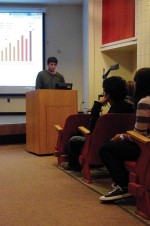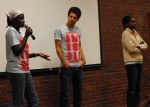 Post Classifieds
Post Classifieds
Real Fair Trade
First Sidore Lecture of the Year features Sarah Bigney of MFTC
On Tues., Oct. 4, Plymouth State University held its first Sidore Lecture of the school year. This year's Sidore Lecture Series explores the growing economic gap between our nation's wealthy and poor, which is currently an unprecedented difference. The Series' first speaker was Sarah Bigney, an organizer for the Maine Fair Trade Campaign (MFTC).
A Maine native, Bigney traveled to Nicaragua, Honduras, Mexico, and other countries in Central and South America to study and get a better understanding of their ill economic environments. There, she saw some of the harshest effects of globalization on local industries.
"It never set well with me that we were just putting a band-aid on the situation," said Bigney, "and it led me to continuously ask why things were the way they were." When Bigney brought these questions back home, she realized that the same trends were plaguing her own family, community, and country.
Bigney's lecture, "Who's Winning, Who's Losing, and Who's Writing the Rules?" focused on what she referred to as "the struggle for justice in the global economy." Bigney's central argument concentrated on the roles of free trade agreements like NAFTA, CAFTA, and the World Trade Organization, and the "completely undemocratic processes" they use to regulate international trade.
Bigney referred to such policies as "weapons of economic mass destruction." Essentially, the design of free trade policies like NAFTA and CAFTA allow large corporations an incredible amount of leverage over their profit markets. Under these agreements, for example, it is possible for a large corporation to sue a state or nation if it passes a law that somehow hinders that corporation's profit potential.
This particular caveat and other similar and ethically bereft loopholes that make up the "rules" of corporate globalization are among the leading causes behind the proliferation and growth of the global wealth gap. These rules give large corporations the luxury of shopping around, so to speak, for the cheapest manufacturers and nations with the loosest environmental laws.
As a result, honest work is being stripped of honest, hard workers. Not just in Nicaragua, or Mexico, or China, but here, too. In New England. In Bangor, Maine. In Plymouth.
"Towns have completely died with such a large loss of manufacturing," said Bigney. "Manufacturing jobs have been shipped to countries that don't have strict laws. We've given away rights to foreign investors that local businesses do not have."
How, then, are all the exploited workers of the world to combat these injustices that have, as Bigney said, "destroyed the backbone of states' economies?" Coalitions like the MFTC are part of a nationwide grassroots movement that work to rebuild our economy so that it is just and democratic.
The MFTC and other similarly driven coalitions work together to promote truly fair economic conditions in an ever-globalizing economy. Many of these coalitions have taken to supporting the TRADE Act. The TRADE Act, if passed, will establish a process to review and renegotiate the terms of existing trade agreements so that fair trade and fair labor rights will be more democratically enforced.
Some of these coalitions have also come together to broaden awareness of the current global economic crisis. Tradestories.org, a product of these efforts, is an ongoing project that attempts to enlighten citizens by sharing stories of people affected by the evils of corporate globalization. Citizens from New England and from Central and South American countries are able to express their feelings about free trade agreements and how their jobs and lives were personally disturbed.
"We created this listening project," said Bigney, "because corporate globalization has displaced so many." Bigney's hope is that, by listening to stories from people far from home that share the same distress, workers of all nations will develop a better understanding for how corporate globalization hurts us all.
"Economic conditions happen for a reason," said Bigney, "and the system can seem so daunting. But we can trade in a totally different – and democratic – way."
Get Top Stories Delivered Weekly
More theclockonline News Articles
Recent theclockonline News Articles
Discuss This Article
MOST POPULAR THECLOCKONLINE

Campton Elementary School 8th Grade Silent Auction & Spaghetti Dinner By Rebecca Tgibedes

Will You? By Isabelle Elsasser

Summer in the Sunflowers By Emily Holleran

Student Spotlight: Sabrina Siegel By Justine Walsh
GET TOP STORIES DELIVERED WEEKLY
FOLLOW OUR NEWSPAPER
LATEST THECLOCKONLINE NEWS
RECENT THECLOCKONLINE CLASSIFIEDS
OUTSIDE THE LINES
- The Gap in Gum Care: Why Caring For Your Teeth’s F...
- Top Tips for Signature Scents and Better-Smelling Laundry
- A Dog Trainer’s Top Tips to Support Pets Through Life S...
- Clear the Air of Indoor Pollutants This Spring
- Stroke & Dementia in Black Men: Tips for Staying Healthy...
- Hispanics and African Americans at Higher Risk for Eye...
- African Americans at Higher Risk for Eye Disease
- Infinity Kings: Final Book In A Favorite Fantasy Series
- What You Need To Know About Keratoconus and the iLink...
- Your Child’s Tomorrow Begins Today
FROM AROUND THE WEB
- Sweeten Your Springtime Salads With Healthy Chilean Grapes
- Young Author Translates 4,000-Year-Old Text to Reveal...
- Keeping Cool and Energy-efficient Amid America’s “...
- Addressing Sarcopenia with a Healthy Diet
- Subway’s New Wraps Elevate Eating on the Go
- Family Teacher Conference Topics Beyond Academics
- Youth Take Down Tobacco
- BookTrib’s Bites: Four Reads to Kickoff Spring
- Curbing Colorectal Cancer in Minority Populations
- Taking Action to Take Down Tobacco
COLLEGE PRESS RELEASES
- Shoff Promotions Comic Book & Sports Card Show
- Semiconductor Research Corp unveils 2024 Research Call, $13.8M Funding
- Charles River Associates Opens Second Scholarship Cycle, Expands to the UK
- BLUMHOUSE AND AMC THEATRES LAUNCH FIRST-EVER HALFWAY TO HALLOWEEN FILM FESTIVAL
- THE GEN Z IMPERATIVE: LISTEN TO FEELINGS AND GIVE GEN Z A VOICE











